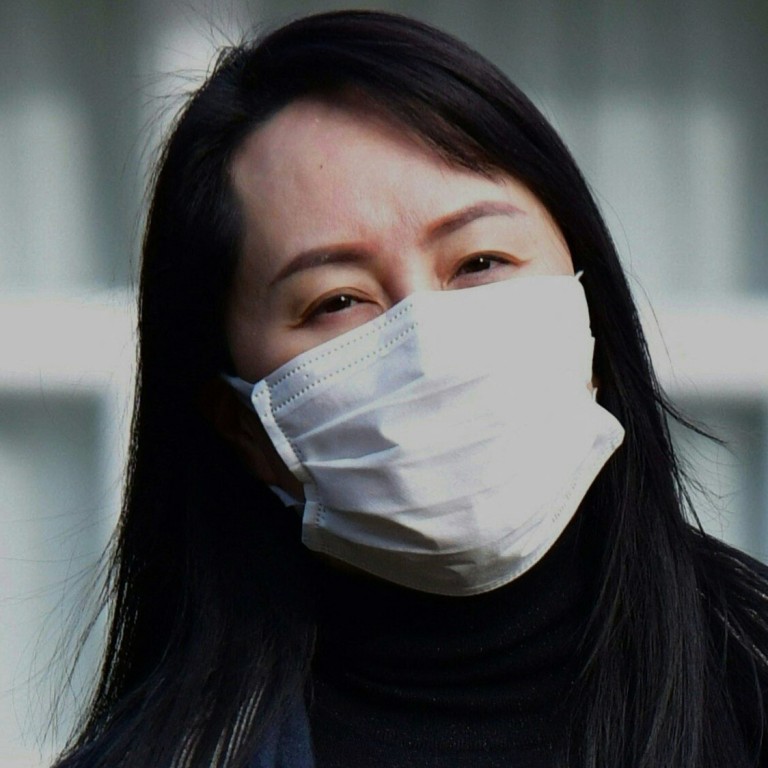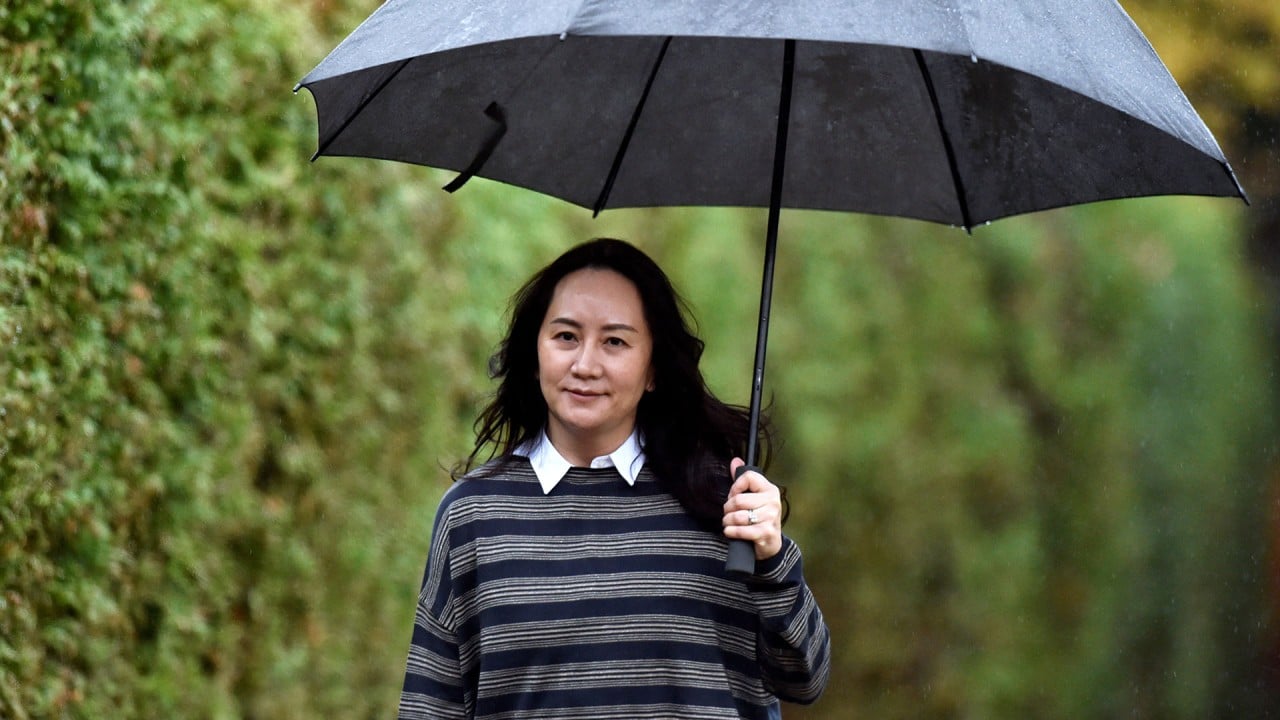
Putting Meng Wanzhou on trial would be ‘triumph for rule of law’, Canadian government lawyer says
- Robert Frater ridiculed defence claims that comments by Donald Trump had tainted Meng Wanzhou’s prosecution, describing the argument as ‘adjectives in search of facts’
- He said justice would be served if the Huawei executive were to be extradited and put on trial for fraud, ‘whether she is convicted or acquitted’
Putting Meng Wanzhou on trial for fraud would be “a triumph for the rule of law”, a Canadian government lawyer said at an extradition hearing for the Huawei Technologies Co. executive on Thursday in Vancouver, as he rejected claims that former US president Donald Trump and other politicians had irreparably tainted her legal proceedings.
They say that the US bid to have her extradited from Canada to face trial in New York is poisoned and should be stayed, and that the case against her has been politicised, citing Trump’s 2018 claim that he would intervene to help strike a trade deal with China.
But government lawyer Robert Frater, representing US interests in the Supreme Court of British Columbia, ridiculed the argument.

00:54
Trudeau rejects releasing Meng Wanzhou to free detained Canadians in China
He told the Associate Chief Justice Heather Holmes that the defence characterisation of Trump’s remarks as “shocking, egregious, corrosive, poisonous” were “adjectives in search of facts to support”.
He said that Trump’s remarks matched neither a dictionary nor case-law definition of what constituted a “threat”, and that if a case was to be made that the US prosecution was political, this was not for a judge to decide.
Instead, that argument should be made to Canada’s minister of justice in the event that Holmes recommended that the extradition request be granted. The minister has the final say in whether to allow extraditions to proceed.
Frater also said the argument about political interference is moot because Trump is no longer president.
“Having these charges heard on their merits would be a triumph for the rule of law,” said Frater.
Everyone in this courtroom knows that the elephant in the room in this case has always been the geopolitical winds that swirl around it … we urge you to focus on the facts and the law and leave the politics to the politicians
Meng’s lawyers have invested much time pointing out supposed weaknesses in the US case, he said, “but be that as it may, if she goes to trial and whether she is convicted or acquitted, justice is served.”
Meng is accused of defrauding HSBC by lying about Huawei’s business dealings in Iran, putting the bank at risk of breaching US sanctions on the country.
On December 11, 2018, 10 days after Meng was arrested at Vancouver’s airport, Trump was asked by the Reuters news agency if he would intervene in her case.
He responded: “If I think it’s good for what will be certainly the largest trade deal ever made – which is a very important thing – what’s good for national security, I would certainly intervene if I thought it was necessary.”
Meng’s lawyers say HSBC ‘fully knew’ about Huawei’s Iran business
Meng’s lawyers also cited comments by Canadian Prime Minister Justin Trudeau on December 19, 2019, when he said, “The United States should not sign a final and complete agreement with China that does not settle the question of Meng Wanzhou and the two Canadians” – Michael Kovrig and Michael Spavor, who were arrested by China days after Meng was detained.
China has charged Kovrig and Spavor with espionage, but Canada says they are hostages.
On Wednesday, Meng’s lawyer Richard Peck said Trump had “co-opted the extradition process in an attempt to leverage Ms Meng and her extradition status” to aid his trade war with China. He called the remarks “abhorrent” and an abuse of process.
But Frater said Trump’s statements were insubstantial and “anodyne”, and US and Canadian political figures had since disavowed them.
‘Abhorrent’ Trump remarks take centre stage at Meng extradition hearing
Meng’s application to stay proceedings because of the remarks “was based on the thinnest of evidence. That evidence only got worse over time … and our position is that the basis never existed,” Frater said.
He added that “no pristine separation” could be made between politics and a prosecution, but it was Holmes’ job to ensure that politics did not intrude on the case.
“Everyone in this courtroom knows that the elephant in the room in this case has always been the geopolitical winds that swirl around it … with respect, we urge you to focus on the facts and the law and leave the politics to the politicians,” said Frater.
Another of Meng’s lawyers, Eric Gottardi, said afterwards that the defence had been “careful not to say … that the charges were politically motivated”. Instead, they argued that there had been an “inappropriate co-opting” of Meng’s prosecution by Trump.

04:43
How the arrest of Huawei CFO Meng Wanzhou soured China's relations with the US and Canada
Arguing for the admission of an affidavit by an expert witness on US law, Michael Gottlieb, Gottardi said the testimony showed that Trump had displayed a “pattern of conduct” that amounted to inappropriate interference in prosecutions.
Gottardi said Frater had tried to normalise Trump’s remarks about Meng’s case. But if the remarks were normal, “how does he explain the immediate reaction to those comments, from both side of the border,” said Gottardi, citing remarks by former Canadian foreign minister Chrystia Freeland and US officials.
“Why, if they are not to be worried about, if they are anodyne?” Gottardi asked.
Trudeau’s 2019 statement linking Meng’s case to a US trade deal, meanwhile, was not mitigated by others in which Canadian officials sought to separate the case from political considerations, Gottardi contended.
“It’s a very troubling statement … my friend [Frater] says ‘you took one statement, and the rest of them are good, and one is bad’. Respectfully, this is really bad. And there’s no undoing the statement,” he said.
In closing, Gottardi added: “This is [the] clearest of cases. And this court, in my submission, should dissociate itself and our entire system from what the [US] president proposed happen and our prime minister agreed [should happen].”
The hearing was adjourned until March 15.
Further hearings in the extradition case are expected to continue until mid-May. Appeals could continue for years.
Meng, chief financial officer of Huawei Technologies and the daughter of company founder Ren Zhengfei, has been living under partial house arrest in a C$13 million (US$10.3 million) Vancouver home while she fights extradition.

